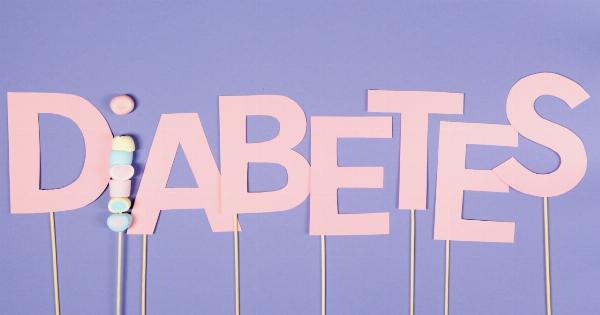Sugar has become an integral part of our daily lives. From the sweet treats we indulge in to the hidden sugars in processed foods, it can be difficult to escape the allure of this addictive substance.
However, as our sugar consumption continues to rise, so does the risk of developing various diseases. In this article, we will explore the rapid increase in disease risk associated with sugar overload, and the importance of understanding the impact it has on our overall health.
Sugar and Obesity: A Dangerous Combination
One of the most prominent consequences of excessive sugar consumption is the rapid rise in obesity rates. Sugar-laden beverages, such as sodas and fruit juices, often contain a significant amount of calories without providing much nutritional value.
These empty calories contribute to weight gain and ultimately increase the risk of obesity.
The Link Between Sugar and Type 2 Diabetes
The prevalence of type 2 diabetes has skyrocketed in recent years, and there is a close association between excessive sugar intake and the development of this chronic condition.
When consumed in high amounts, sugar leads to a rapid spike in blood glucose levels, putting a strain on the body’s insulin production and leading to insulin resistance. Over time, this can contribute to the development of type 2 diabetes.
Sugar’s Impact on Heart Health
Heart disease is the leading cause of death worldwide, and sugar consumption plays a significant role in its development. Studies have shown that a high intake of added sugars can significantly increase the risk of developing heart disease.
Excessive sugar consumption leads to elevated triglyceride levels, increased blood pressure, and a higher likelihood of developing obesity and type 2 diabetes – all of which are major risk factors for heart disease.
The Role of Sugar in Liver Disease
Our liver is responsible for processing and metabolizing sugar. However, when we consume excessive amounts of sugar, our liver becomes overwhelmed and starts converting the excess into fat, leading to non-alcoholic fatty liver disease (NAFLD).
NAFLD can progress to more severe conditions such as liver fibrosis and cirrhosis, potentially leading to liver failure.
Sugar’s Impact on Dental Health
Sugar is a primary contributor to tooth decay and various dental problems. When we consume sugary foods and beverages, the bacteria in our mouth feed on the sugar and produce acid. This acid erodes tooth enamel, leading to cavities and tooth decay.
Additionally, excessive sugar consumption promotes the growth of harmful bacteria in the mouth, increasing the risk of gum disease and other oral health issues.
The Connection Between Sugar and Cancer
Emerging research has established a connection between sugar consumption and cancer development.
Sugar-rich diets, especially those high in fructose, have been linked to an increased risk of certain types of cancer, such as breast, colorectal, and pancreatic cancer. Excessive sugar consumption can lead to obesity and chronic inflammation, creating an environment that promotes cancer cell growth.
Sugar’s Impact on Mental Health
While the physical health implications of excessive sugar consumption are widely known, its effects on mental health are often overlooked.
Studies have shown that diets high in added sugars contribute to an increased risk of depression and other mental health disorders. Consuming large amounts of sugar causes rapid fluctuations in blood sugar levels, leading to mood swings, irritability, and decreased overall mental well-being.
Sugar and Aging: A Harmful Combination
Not only does excessive sugar consumption impact our overall health, but it also accelerates the aging process.
A diet high in sugar leads to the production of advanced glycation end products (AGEs), which damage collagen and elastin in the skin, resulting in wrinkles and sagging. Furthermore, sugar promotes inflammation in the body, contributing to premature aging at a cellular level.
Tips for Reducing Sugar Intake
Reducing sugar intake may seem like a daunting task, especially considering its widespread presence in the modern food industry. However, there are several practical steps you can take to gradually decrease your sugar consumption:.
- Avoid sugary beverages and opt for water, herbal tea, or unsweetened drinks.
- Read food labels and be mindful of hidden sugars in packaged and processed foods.
- Choose whole, unprocessed foods that are naturally low in sugar.
- Cook meals at home and control the amount of sugar added to dishes.
- Experiment with natural sweeteners such as stevia or monk fruit extract.
- Limit the intake of sugary snacks and desserts, saving them for occasional treats.
- Gradually reduce the amount of sugar you add to your coffee, tea, or cereal.
- Replace sugary spreads and condiments with healthier alternatives.
- Focus on incorporating more fiber, protein, and healthy fats into your diet to help reduce sugar cravings.
- Seek support from friends, family, or a healthcare professional if you find it challenging to reduce your sugar intake.
Conclusion
Sugar overload poses a significant threat to our overall health, contributing to the rapid increase in various diseases such as obesity, type 2 diabetes, heart disease, liver disease, dental problems, cancer, mental health disorders, and premature aging. Understanding the implications of excessive sugar consumption is crucial for making informed choices about our diet and lifestyle.
By gradually reducing our sugar intake and adopting healthier alternatives, we can mitigate the risks associated with sugar overload and improve our overall well-being.



























